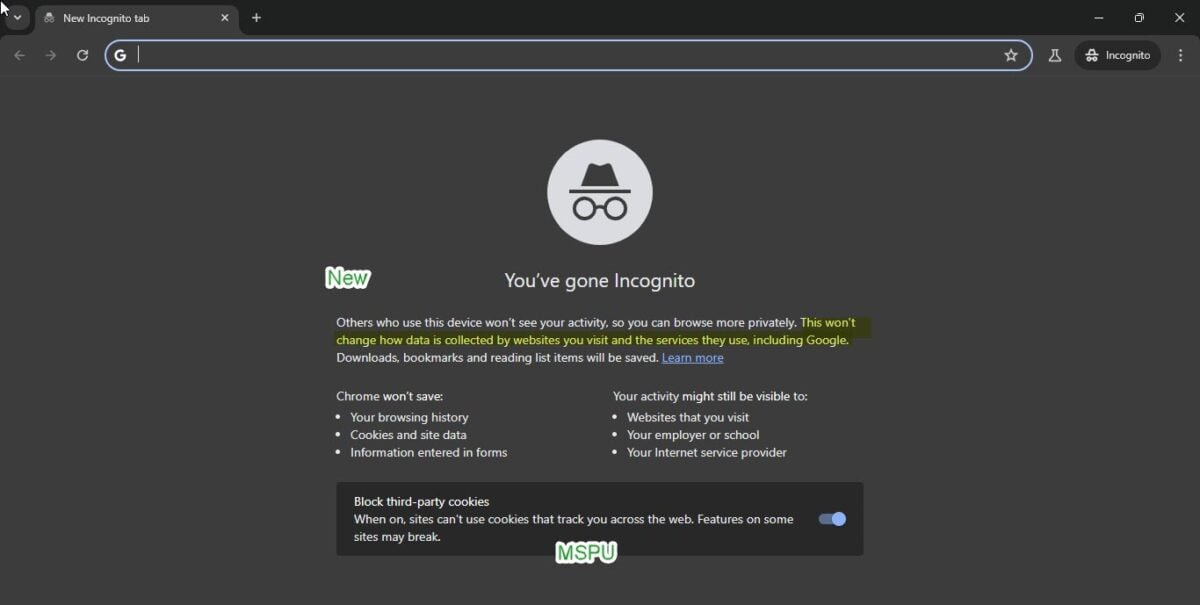Highlights
- Google agrees to a $5 billion settlement over Chrome Incognito Mode tracking.
- Updated Incognito Mode disclaimer now live in Chrome Canary.
- New disclaimer explicitly states data collection practices by websites, including Google.
- Incognito Mode offers privacy, but not anonymity from online tracking.
This decision comes in the wake of a class-action lawsuit filed in 2020, which accused the tech giant of collecting data from users even when they were browsing in Incognito Mode.
Google had defended its position, stating that the data collection practices were mentioned, although not explicitly in the disclaimer itself.
Redesigning the Incognito Mode Disclaimer

In response to the lawsuit and the settlement agreement, Google is taking proactive steps to update the disclaimer for Incognito Mode.
The revised disclaimer, now live in the Canary version of Chrome on various platforms including Android and Windows, aims to provide clearer information about data collection practices by websites, including Google.
The updated disclaimer in the Canary build of Chrome now explicitly states: “Others who use this device won’t see your activity, so you can browse more privately.
This won’t change how data is collected by websites you visit and the services they use, including Google.
Downloads, bookmarks, and reading list items will be saved.”
This change is intended to offer greater transparency to users about the data collection that occurs even in Incognito Mode.
Understanding Incognito Mode

Despite the popular belief, Incognito Mode in Chrome does not equate to anonymous browsing.
The mode primarily prevents the local saving of browsing history, cookies, and site data.
However, it does not stop websites, including Google, from tracking user activities.
The built-in third-party cookie tracking prevention in Incognito does offer some level of privacy protection, but it does not make the user completely invisible online.
Implications for Users and Privacy Practices

This development underscores the importance of user awareness regarding online privacy.
While the Incognito Mode offers more privacy compared to regular browsing, it is not a comprehensive solution for avoiding online tracking.
Users should be aware of the limitations of Incognito Mode and the extent to which their online activities can be tracked.
Google’s decision to update the disclaimer is a step towards greater transparency, aligning with user expectations and legal requirements.
This move could also prompt other tech companies to reassess their privacy disclosures and practices, leading to more informed choices for users.
FAQs
What prompted Google to update the Chrome Incognito Mode disclaimer?
Google agreed to a $5 billion settlement following a lawsuit alleging user data tracking in Incognito Mode.
This led to the update of the Incognito Mode disclaimer for clearer communication about data collection practices.
What does the new Incognito Mode disclaimer state?
The updated disclaimer in Chrome Canary clarifies that while other users of the device won’t see your activity, websites, including Google, can still collect data.
It also mentions that downloads, bookmarks, and reading list items will be saved.
Where can users see the updated Incognito Mode disclaimer?
The new disclaimer is currently available in the Canary version of Chrome on various platforms such as Android and Windows.
Users can view it when opening a new incognito tab/window.
Does Incognito Mode prevent all forms of online tracking?
Incognito Mode in Chrome does not offer complete anonymity. It primarily prevents the local saving of browsing data but does not stop websites from tracking user activities.
What is the basis of Google’s $5 billion lawsuit settlement?
Google has agreed to a $5 billion settlement due to allegations that it tracked personal data of users even when they were using the Chrome Browser’s incognito mode, a feature presumed to offer privacy.
How far back do the violations in the Google lawsuit go?
The lawsuit claims violations dating back to June 1, 2016. It implicates a substantial number of users who believed their data was private, especially in incognito mode.
Who are eligible for the lawsuit settlement against Google?
The settlement is currently restricted to US customers. Each individual involved in the lawsuit sought damages of at least $5,000 for breaches of federal wiretapping laws and California’s privacy statutes.
Was there another significant settlement by Google recently?
Yes, Google also settled another lawsuit for $700 million related to anti-competitive practices in the Google Play Store, with a significant portion of the settlement allocated to affected Play Store customers.
Also Read: Google Agrees to $5 Billion Settlement in Privacy Lawsuit
Also Read: Google Agrees to Pay a $700 Million Antitrust Settlement in the US
